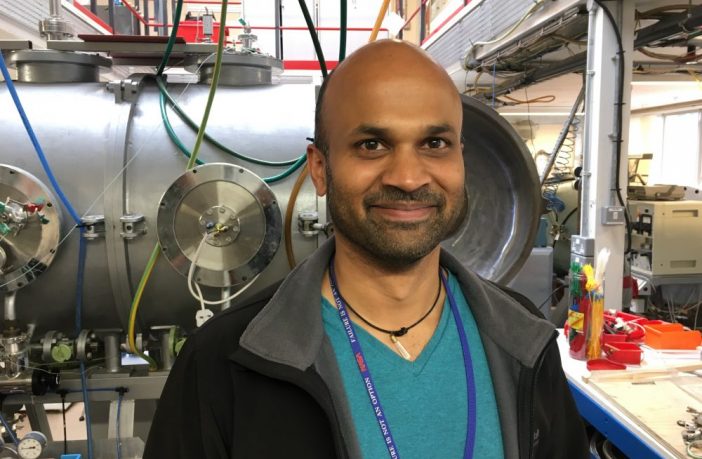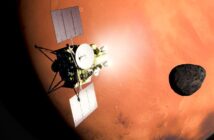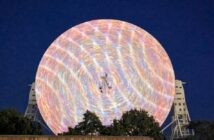Dr Manish Patel was inspired by space at a young age; venturing out in the middle of the night stargazing with his dad and his telescope. He studied an MPhys in Physics and Space Science at the University of Kent, more out of interest than as a career. After that, in what he describes as “a bit fortuitous”, he went on to study a PhD at The Open University as a member of the Beagle 2 team on a mission to Mars. Almost 13 years later, and with an MBA from the OU under his belt too, Manish is now leading on a scientific instrument on one of the most advanced space missions in the world: ExoMars. For OU Space Month and as the countdown to the ExoMars landing begins, Manish shares his story…
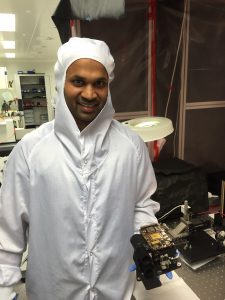
Dr Manish Patel
When did you first get interested in space?
My dad loved astronomy. He bought a telescope when I was young and we used to venture out in the middle of the night stargazing; that’s when my initial interest began. As a teenager, I was always interested in space and astronomy, but never considered a career in it. For my A Levels I studied Chemistry, Maths, and Physics, and then went to the University of Kent to study an MPhys in Physics and Space Science. I suppose I just pursued an academic interest in the subject without thinking too much about what career path I wanted and where it would lead me.
How did you choose where to study?
My decision to study at the University of Kent was really straightforward as it was one of only two places in the UK that offered a course with a dedicated Space Science aspect at that time – the other being the University of Leicester. It also offered an exchange programme with Indianapolis University, which was something else that I really wanted to do. It was a four year Masters, with the third year being entirely over in the US and, because the terms are different there than in the UK, I basically finished my second year at Kent on the Friday, and by the Monday, I was on my first day at Indianapolis. The great thing about that was I had a double-summer the next year and travelled around the whole of North America; it was fantastic!
What influenced your next steps into space science?
I finished my Masters without actually knowing what the next step would be. I was planning to search for a role in the space industry and started applying for jobs when one of my tutors from the University of Kent took me aside and said, ‘there’s a PhD position coming up here working on space mission instrumentation, would you like to do it?’
It was a bit fortuitous; one might say fate. It was a lifetime opportunity that was perfectly timed with the Cassini-Huygens and Beagle 2 missions. The Cassini-Huygens Mission had already launched, so my role was preparing for the analysis of the data that would be beamed back. The Beagle 2 mission, led by the late Professor Colin Pillinger, was currently in development so I was collaborating with other academics on some of the scientific instruments on the spacecraft. That was really incredible and I was really, really lucky to have had that opportunity.
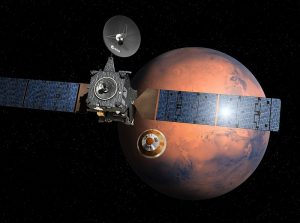
Schiaparelli separating from Trace Gas Orbiter. Image credit: ESA
How did you ‘launch’ your career with the OU?
I started my PhD at the University of Kent and then the whole Space Science team relocated to The Open University in Milton Keynes so I moved there with them. It was the PhD and my role in the mission at The Open University which launched my academic career – excuse the pun. It changed my future career goals and made me realise that research was something I really wanted to be a part of; after that, I didn’t want to work in a typical nine-to-five office job.
It was weird changing from a traditional campus to The Open University; being a distance learning institute, there are hardly any students at Walton Hall other than PhD researchers – it was very, very strange, but you kind of get used to that and realise it’s a bit more of an academic research environment without the distraction of thousands of students.
Once you got your PhD, what space missions were you involved with?
Beagle 2 was lost on the surface so I was assigned to the Cassini-Huygens Mission, spending just over two years preparing code that would enable us to process data when it landed on Titan in 2005. Being at ESOC Mission Control in Darmstadt, Germany, was an incredible experience. Landing on a planet that nobody had ever landed on before and seeing the first image of the surface of a world that had never been seen before was remarkable. I was there with the team of scientists as the view from a truly alien world was transmitted from the surface.
The team at The Open University was originally selected to support the ExoMars Rover Mission, which was supposed to launch in 2011 and became significantly delayed; we were then selected for the ExoMars Trace Gas Orbiter Mission, which launched in March 2016. I am leading the team that developed part of the NOMAD Instrument, UVIS.
You now lead the team. How did you get promoted?
I hadn’t completed any project management training at that point; I was relatively fresh out of my PhD and, although the instrument I was working on was my design, it was being led by a more senior colleague at the time. By 2010, the responsibility of managing a major element of an international space mission had transitioned to me and that was when I decided it would be beneficial to enrol on The Open University MBA. I started with a course in project management and moved to the full MBA, studying each stage when I had the capacity.
The most challenging element of combining distance learning and working was self-organisation and management of my spare time. It wasn’t a skill I possessed and had to develop it quickly.
I’d say my MBA has definitely been a benefit; it was really interesting and a lot of it was quite revealing. I suddenly understood why certain decisions were being made in my department and why senior management acted or responded in a certain way. It helped me to appreciate the broader picture of strategy and teamwork. Personally, having the skills that the MBA gives you allows me to successfully manage a space mission, and should enable me to get a job in another sector if research funding is dramatically reduced in the UK. There’s always a risk in science that your funding might be cut and changes happen, such as leaving the EU. Having that extra string to my bow allows me to relax a little and enables me to have a greater chance if I had to change my career or apply for jobs elsewhere.
If you could travel anywhere in the solar system, where would it by and why?
Mars would be relevant for me, but I think it would be Titan. It is one of the most mysterious places that has been discovered. It’s this planet-sized moon orbiting Saturn, shrouded in a cloud of mystery. There are some weird things happening there – you have strange and rivers of hydrocarbons; basically, similar to the gas that is produced by your cooker, but flowing in liquid form. It’s a really weird environment that I would love to see with my own eyes.
If you were funded to study any big question in science or space, what would you choose?
I think it would have to be the one that we’re trying to look at now, which is to establish if there life in the universe. I think it’s a question that echoes around society and our entire culture. It’s the kind of question that everyone cares about and it will affect everyone if we answer it either way – whether it’s a no or a yes.
You can follow the ExoMars landing during OU Space Month by following the hashtag on Twitter.
